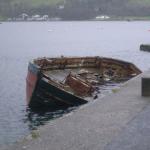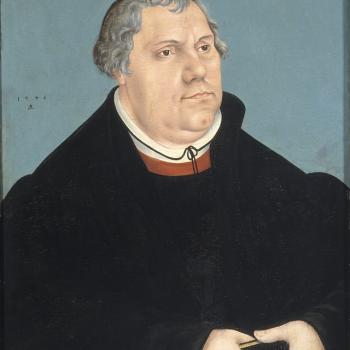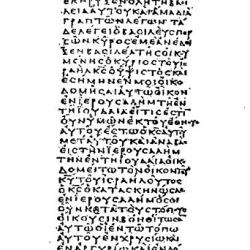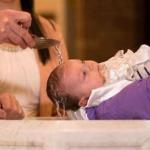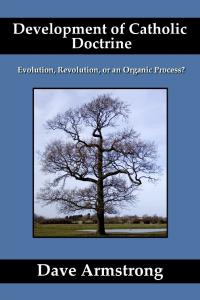
Hayes seems to realize that simply assuming the conclusion of what one wants to prove Biblically becomes tenuous in light of history. For Hayes, elements of Purgatory are found in 2 Maccabees 12, but as to purgatory proper, it was the result of development begun at the level of popular piety. For Catholic apologists, the text simply means purgatory. These are two very different approaches.
This is found in his article, “The Perspicuity of 2 Maccabees 12 on Purgatory?” (Boors All revised version of 9-16-11). He starts out by referring to an imaginary “gulf between Catholic scholarship and popular Catholic apologists . . . Many of the current Catholic apologists look at Biblical texts and simply assume they clearly prove purgatory.” The version on his Boors All blog is the “de-Armstronged” one: the game he plays where he refuses to name my name, even when he refers to my books. The original (with my dreaded name) was posted on James White’s blog on 3 March 2009. Here is the heart of his argument and blast against Catholic apologists:
When Karl Keating addresses this text in Catholicism and Fundamentalism (San Francisco: Ignatius Press, 1988), he first asserts “Scripture teaches that purgatory exists” (p. 193) and then among a few proof texts, he bolsters his claim with: “Then there is the Bible’s approbation of prayers for the dead: ‘It is a holy and wholesome thought to pray for the dead, that they might be loosed from their sins’ (2 Macc 12:46).” In his book What Catholics Really Believe he states, “Unless it refers to Purgatory, 2 Maccabees 12:46 makes no sense” (p. 90). In his book, Answer Me This! (Huntington: Our Sunday Visitor, 2003), Patrick Madrid states, “The doctrine [of purgatory] is expressed clearly in the Old Testament book of 2 Maccabees 12” (p. 204). The New Catholic Answer Bible [Wichita: Fireside Catholic Publishing, 2005] insert [written by Paul Thigpen] answers the question “Is Purgatory in the Bible?” by stating, “The writer of 2 Maccabees praises the offering of prayers and sacrifices for the dead (see 12:38-46). Why do the departed need such assistance from us? So that their sins ‘might be blotted out’ (12:42)” (Insert H2). In his book, A Biblical Defense Of Catholicism [MS Word Version, 2001] Dave Armstrong has a section entitled “Scriptural Evidence for Purgatory.” The account described in 2 Maccabees 12:39-42, 44-45 is said to “presuppose purgatory” (p.128). . . .
In their zeal to win converts, current Catholic apologists think that simply citing a verse will be enough to win converts. When they’re challenged to exegete a passage, texts like 2 Maccabees 12 become minefields. For instance, Dave Armstrong’s “Biblical defense” of this text boils down to saying Jewish people prayed for the dead and Jesus never corrected this belief as an error of the Jews, nor did he deny a “third state” in the afterlife (p.128).
Now let’s unpack this nonsense. Paul Thigpen, in The New Catholic Answer Bible (notes co-written by yours truly) did not claim that this passage proved the full-blown doctrine of purgatory. Swan cited only the section that he mistakenly think bolstered his own critique. Rather, he states:
Like “the Holy Trinity,” “purgatory” is a term not occurring in Scripture; but the reality it refers to is implied by scriptural truths.
This is virtually the same point that Fr. Hayes makes. Swan cites him, writing about 2 Maccabees 12:39-45, as “evidence for the existence of a tradition of piety which is at least intertestamental and apparently served as the basis for what later became the Christian practice of praying for the dead and performing good works, with the expectation that this might be of some help to the dead. . . . we might better ask if anything in Scripture initiated the development that eventually led to the doctrine of purgatory.”
Fr. Hayes accepts development of doctrine; so do Catholic apologists. There is no fictional “divide” here. Swan is simply spinning and engaging in obscurantism and sophistry. Karl Keating’s book, Catholicism and Fundamentalism, cited by Swan, also has a twelve-page chapter, “Development of Doctrine,” in which he states, “Doctrines had to be thought out, lived out, even pierced together, over centuries” (p. 142). This includes the doctrine of purgatory. In Keating’s other book that Swan brings up, What Catholics Really Believe, he’s also more tentative and nuanced than what Swan very selectively presents to his readers:
But does Scripture mention purgatory directly, even under some other designation? Maybe . . . (p. 89)
Scripture at least indicates that a third state, apparently much like purgatory, could exist. (p. 90)
I don’t have Patrick Madrid’s book that Swan cites, but I have a similar one (signed by the author!), Why is That in Tradition? (Our Sunday Visitor, 2002). In that volume he discusses development of doctrine from pages 16-23, including using the famous acorn to oak analogy of development (pp. 19-20). He wrote in another book of his that purgatory “is expressed clearly in the Old Testament book of 2 Maccabees 12” but it doesn’t follow that it was the fully developed doctrine. And that prooftext involves deduction as well. Even the Holy Trinity was not fully developed for some five centuries after Christ. This is nothing unique at all.
***
“Please Hit ‘Subscribe’”! If you have received benefit from this or any of my other 4,600+ articles, please follow this blog by signing up (with your email address) on the sidebar to the right (you may have to scroll down a bit), above where there is an icon bar, “Sign Me Up!”: to receive notice when I post a new blog article. This is the equivalent of subscribing to a YouTube channel. Please also consider following me on Twitter / X and purchasing one or more of my 55 books. All of this helps me get more exposure, and (however little!) more income for my full-time apologetics work. Thanks so much and happy reading!
***
Then he comes to me. Any insinuation that I somehow am unaware of development of doctrine (whether concerning purgatory or any other doctrine) is flat-out ludicrous. It’s the main reason I was persuaded of the truth of Catholicism (after reading St. Cardinal Newman’s Essay on the Development of Christian Doctrine), and I have a web page devoted to it, as well as a book. My first book, A Biblical Defense of Catholicism; completed in 1996), that Swan cites, has a 13-page chapter on development, too (which can be read online for free). I wrote in this chapter:
At the very least, these passages prove that there can and does exist a third, intermediate state after death besides Heaven and Hell. Thus, Purgatory is not a priori unthinkable from a biblical perspective (as many Protestants casually assume). True, the Hebrew Sheol is not identical to purgatory (both righteous and unrighteous go there), but it is nevertheless strikingly similar. (p. 133)
I have even commented in one of my articles about the passage in question from 2 Maccabees:
[T]he question is, why did the Jews “pray for the dead” and “make atonement for the dead” as the passage in 2 Maccabees states? They did because they assumed that the dead were still in some sort of state in which they could be aided by intercessory prayer. And that can only be a third state besides heaven and hell. This is what the people whose practice is described must have believed. It doesn’t require a fully developed notion of purgatory; only an intermediate state of some sort besides heaven and hell: a place where they can still be helped by prayer on their behalf. . . . (“Purgatory: My Biblical Defense Of Its Doctrinal Development”: 9-20-11)
I’ve made many other similar statements, as documented in the above article:
The bulk of Newman’s extraordinary work is devoted to the exposition of a series of analogies, showing conclusively that the Protestant static conception of the Church (both historically and theologically) is incoherent and false. He argues, for example, that notions of suffering, or “vague forms of the doctrine of Purgatory,” were universally accepted, by and large, in the first four centuries of the Church, whereas, the same cannot be said for the doctrine of original sin, which is agreed upon by Protestants and Catholics.
Protestants falsely argue that purgatory is a later corruption, but it was present early on and merely developed. Original sin, however, was equally if not more so, subject to development. One cannot have it both ways. If purgatory is unacceptable on grounds of its having undergone development, then original sin must be rejected with it. Contrariwise, if original sin is accepted notwithstanding its own development, then so must purgatory be accepted. (“Development of Doctrine: A Corruption of Biblical Teaching?”: published in The Catholic Answer, Sep. / Oct. 1995)
Like “the Holy Trinity,” “purgatory” is a term not occurring in Scripture, but the reality it refers to is implied by scriptural truths. [The Catholic Answer Bible, 2002]
Authority in the early Church was developing just as the biblical canon and Christology and Mariology and purgatory and prayers for the dead and original sin and everything else were developing. [1-10-04]
Of course we won’t find a fully developed medieval conception of purgatory [in 1 Cor 3], but it is foolish to expect that anyway, just as it would be to expect to find full Chalcedonian Christology and trinitarianism in all its glorious nuanced complexity. That is true of all doctrines, so why should purgatory be an exception? [3-3-07]
Gavin [Ortlund] mentions the “core essence” of purgatory. Yes, we Catholic apologists (including Trent Horn) often focus on that, especially regarding the earlier Church fathers because this is how it is with virtually all doctrines. They develop and become much more fully understood as time goes on. So there is nothing odd or unusual about boiling down the essence of the doctrine to a few ideas. It can be as simple as five words: “purging of sin after death.” Things, for example, like whether the purgatorial “fire” is literal or not, or whether purgatory is a place or condition, are not essential elements. And for that reason, Catholics are allowed to hold different views on those matters. (“Reply #2 To Gavin Ortlund On Purgatory”: 5-14-22)
I habitually either qualify or presuppose doctrinal development or make clear in context that I am not claiming that Scripture “proves” a full-blown doctrine of purgatory. Hence, I used to have a paper up, entitled, “50 Bible Passages On Purgatory and Analogous Processes”.
The very title shows that I was not maintaining that each passage was explicit, and that there were analogies of process that suggested the concept of purgatory. A hundred times in my writings, I’ve stated that the Catholic notion of “biblical evidence” is not absolute proof, but rather, consistency and harmony with Scripture and a given doctrine, including implicit and indirect, deductive indications.
As usual, James Swan performs very poorly in his “research” and winds up warring quixotically against several straw men (all the Catholic apologists he critiques and their fictional supposed antipathy to development of doctrine). Pray for the man. So much twisting and misrepresenting of others’ views — no matter how much he may tragically despise their theology — can’t possibly be good for his soul. “You shall not bear false witness” (Mt 19:18; cf. Ex 20:16: one of the Ten Commandments).
*
Practical Matters: Perhaps some of my 4,600+ free online articles (the most comprehensive “one-stop” Catholic apologetics site) or fifty-five books have helped you (by God’s grace) to decide to become Catholic or to return to the Church, or better understand some doctrines and why we believe them.
Or you may believe my work is worthy to support for the purpose of apologetics and evangelism in general. If so, please seriously consider a much-needed financial contribution. I’m always in need of more funds: especially monthly support. “The laborer is worthy of his wages” (1 Tim 5:18, NKJV). 1 December 2021 was my 20th anniversary as a full-time Catholic apologist, and February 2022 marked the 25th anniversary of my blog.
PayPal donations are the easiest: just send to my email address: apologistdave@gmail.com. Here’s also a second page to get to PayPal. You’ll see the term “Catholic Used Book Service”, which is my old side-business. To learn about the different methods of contributing (including Zelle), see my page: About Catholic Apologist Dave Armstrong / Donation Information. Thanks a million from the bottom of my heart!
*
***
*
Photo Credit: book cover for my (copyrighted) 2007 book, designed by Chad Toney [info. and purchase information]
Summary: Anti-Catholic James Swan absurdly contended that lay Catholic apologists & Catholic scholars have a huge disagreement as to whether the doctrine of purgatory developed.


